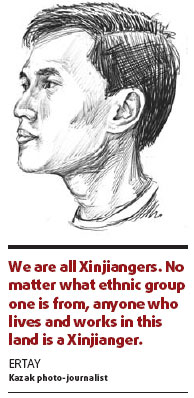As?master communicator and visual artist, Ertay sees much beauty in the world. And he says he strongly believes in the Kazak folklore that togetherness is happiness.

The 32-year-old photo-journalist moved to Urumqi, capital of the Xinjiang Uygur autonomous region, from his native Altay prefecture 13 years ago with the duel goal of integrating and protecting his cultural identity.
"Urumqi is a multi-cultural city with a fast flow of information. It is where different people can show their talents," said Ertay, who is ethnic Kazak and also speaks Mandarin, Uygur, Kirgiz and some Russian dialects. "That's why I chose to stay after leaving Xinjiang University instead of going home.
"I have many Han and Uygur friends. We are all Xinjiangers. No matter what ethnic group one is from, anyone who lives and works in this land is a Xinjianger."
He said the riot in Urumqi will not affect his life and added: "The rioters are just a small group. The emotional ties between people were not established in a short time, and they will not be destroyed easily."
Sport has been an important part of his life. A talented long-distance runner and college champion in the 5,000 m and 10,000 m, he said sport has helped build bridges between the different groups.
"I got to know more people through sport. At school I often went to the playground to join a random team to play basketball or soccer. They were almost always made up of people from various backgrounds."
The eighth of nine children, he was one of five siblings who went to college. "Kazak people are paying more attention to education," he said. "In the past, if there were four children in a family, usually two would stay and herd sheep. But now Kazak people would rather hire people to look after their livestock and send children to school.
"The world is changing. For instance, I read and watch more news in Chinese than in Kazak, because it is updated more often. I use online chatrooms, as well as QQ and MSN messengers. Although this is a very different environment to the one my forefathers grew up in, I don't worry about losing my Kazak cultural identity."
Ertay, who has a two-year-old daughter, added: "As the life of Kazak people change, the Kazak culture will change, but it will never disappear. Although I live in a city instead of the prairie, I still play my dombra (a plucked instrument) and sing Kazak folk songs."
One thing he looks forward to changing is his understanding of the English language.
"I went to the Olympics in Beijing last year, it was one of the most exciting experiences of my life, especially when ethnic Kazak boxer Hanati Silamu won a bronze medal for China.
"My only regret was I could not communicate very well with foreign colleagues, except through hand gestures. So after I returned to Xinjiang I decided to teach myself English.
"My daughter is still young but I will encourage her to learn English when she starts school. I think her generation will be more open to the world."
(China Daily July 15, 2009)